"Germany's reputation is suffering"
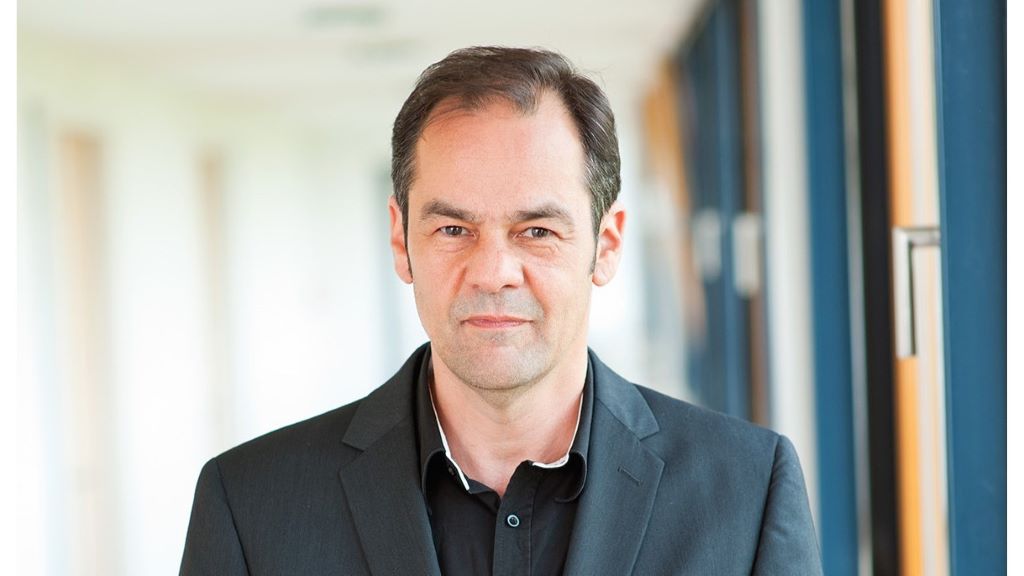
Mr. Hafez, what are the differences when you compare reporting in Germany on the massacre perpetrated by Hamas and Israel's war in Gaza to international media reports?
Kai Hafez: Every country has its own characteristics, its own culture of discourse, but my general impression is that in the countries of the Global South – and this applies not only to Arab countries but also to Latin America and Africa – much more attention is paid to Palestinian concerns in the overall conflict.
Palestinian objectives such as the envisaged two-state solution, along with the entire complex of Israeli colonialism, are given greater focus. By contrast, the issue of anti-Semitism is emphasised more in Germany than anywhere else in the world.
We tend to see this conflict very much from the perspective of our own past. We almost automatically suspect anti-Semitism behind every pro-Palestinian stance. Sometimes this is justified, but often it is exaggerated, and the definition of anti-Semitism that is being applied is unclear. The Palestinian agenda is about territorial claims, and racist hatred is of secondary importance.
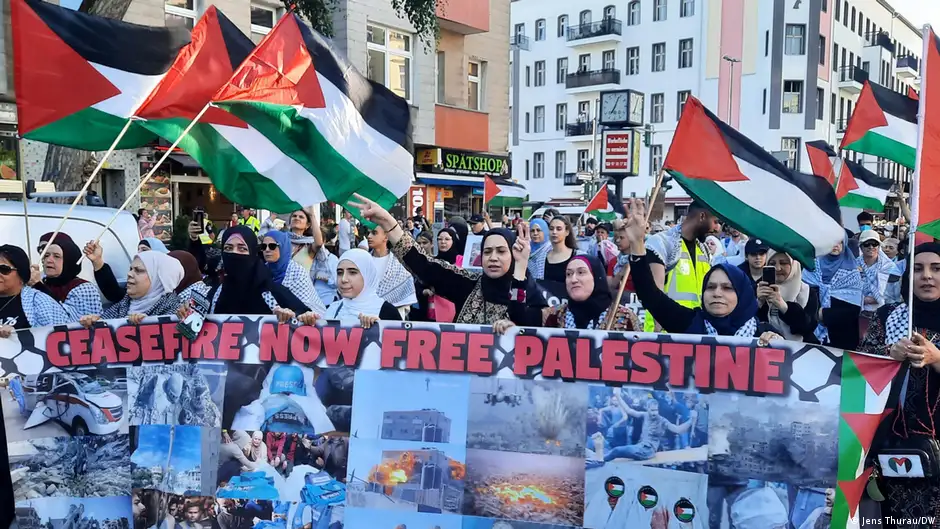
Room must be made for different opinions
It is often argued that Germany has a historical responsibility towards Israel.
Hafez: But it is still not right to demand that we all speak with one voice in our coverage. What about the dictum of free and independent media, both here and in a global public sphere? Different opinions must be recognised.
Regarding an unconditional German obligation towards Israel as absolute is a legitimate position, but it is not the only one.
Instead, we can formulate arguments reminding Israel that forms of state terrorism are just as illegitimate as underground terrorism by Hamas, and that waging war at the expense of civilians, which is what we are seeing at the moment, is not permissible.
Moreover, the attitudes of the West German states and former East Germany were not always so unilaterally on the side of Israel.
What phases did they go through?
Hafez: After a period of relative ignorance post-1945, West Germany entered into a very close alliance with Israel in the 1960s, including arms deliveries. In the 1970s and 80s, social democratic governments then gave greater prominence to Arab interests, to the point where – and I was directly involved in these processes – the West German government was the largest financier of the Oslo peace process on the Palestinian side. Many people forget that.

Seven uncomfortable truths
Anyone wanting to fully understand the current Middle East crisis must face up to realities on the ground. For many, however, this is at odds with the schematic picture they have in their heads. Here are seven uncomfortable truths crucial to de-escalating the situation and finding a solution
The debate is only slowly opening up
Germany has by no means always been so one-sided in its support, nor – if we look at the financial balance sheet – is it today. In many ways, it is therefore short-sighted to believe that we must stand unilaterally on the side of Israel in such a crisis.
Such a resolute stance leaves no more room for media discussion or Palestinian objections. A transformation-oriented foreign policy certainly won't be able to emerge in this way. Germany thus becomes a mere observer and deprives itself of any opportunity to be an active participant. This is misguided. Germany's main task at the moment should be to promote dialogue between Israeli and Palestinian stakeholders, something that is currently not possible in the region itself. But I'm afraid we won't manage to do so, and that is testament to our inadequacy.
More and more voices critical of Israel are indeed being heard on the fringes of the discourse. Typical for such conflicts is that initially, during the hottest phases, there is a taboo against any criticism and that the debate opens up only gradually as the conflict progresses.
Both sides prone to disinformation
We see the same pattern occurring in other conflicts. How can the media avoid this trap of taking an uncritical stance at the beginning of a war?
Hafez: According to the paradigm of peace journalism, the main task of journalists is to give space and voice to legitimate positions in a conflict. This does not include everyone. I would exclude right-wing extremists in the Israeli government, just as I would Hamas. It has forfeited its right to speak. But all other people involved, whether in Israel, Palestine or Germany, who fundamentally recognise each other's right to exist, must be heard.
We need to make sure these voices are represented, to promote dialogue and pay attention to where our sources, the basis of our information, come from. A lot of this is going very wrong in the media at the moment.
Please give an example.
Hafez: I recently took part in a debate with the Israel correspondent at Deutschlandfunk. He asked me whether we should be just as critical of information provided by the Israeli government on the conflict as we are of information from Hamas. I was astonished by the question. Of course we have to be just as critical! We know the Israeli government is just as prone to spreading disinformation as Hamas.
To this day, for example, it still remains unclear whether there was a Hamas command centre under the Shifa Hospital in Gaza, as Israel claimed. And there are many more unanswered questions, yet Israeli positions are constantly fed into the news flow with the identifier, "the Israeli government says".
That is a second major mistake. We have to do our basic duty here and clarify the facts. And we must de-escalate things on an emotional level. We are doing far too much to hypermoralise this conflict: watchword anti-Semitism.
It is not our place as Germans to blame the Palestinians for anti-Semitism. Of course, there is anti-Semitism there, just as there is in Germany and worldwide. Anti-Arabism and Islamophobia also exist on the Israeli side: attitudes we never actually talk about, but which are widespread in the current Israeli government and society. Peace journalism requires the media to promote a climate of peace: first and foremost, this means disarming emotionally.
Debate must not be made taboo
Anti-Semitism is unacceptable and we as a society must take action against it. At the moment, however, it is easy to get the impression that the term is being used in such an inflationary way that it is serving to suppress critical voices. Can we put a stop to this?
Hafez: The tendency to have a debate on anti-Semitism when what we should really be discussing is the conflict at hand is an old problem in Germany. It was already present in the 1980s, when Israel bombed Beirut in 1982. At that time, the left-wing taz newspaper, for example, launched an anti-Semitism debate. For decades, we have been caught up in this knee-jerk reaction, so it is high time to put some thought into how we actually define anti-Semitism.
In the narrow sense, anti-Semitism means racist, negative collective attributions regarding a religious or ethnic group. Everything else, criticism of Israel and Zionism, is – strictly speaking – not anti-Semitism.
We can discuss whether an image of Israel that focuses only on negative facets verges on the anti-Semitic. But in the context of a conflict, it must be possible to criticise a government.
This second level of anti-Semitism, drawing on old stereotypes about the one-sidedness of a critical agenda, must not be permitted to come into play in the debate on a conflict. Therefore, to my mind, criticising Israel for its colonial and military policies, or campaigning for a ceasefire, has nothing to do with anti-Semitism.
We can talk about which positions are coherent and balanced. And such a debate should not be taboo.
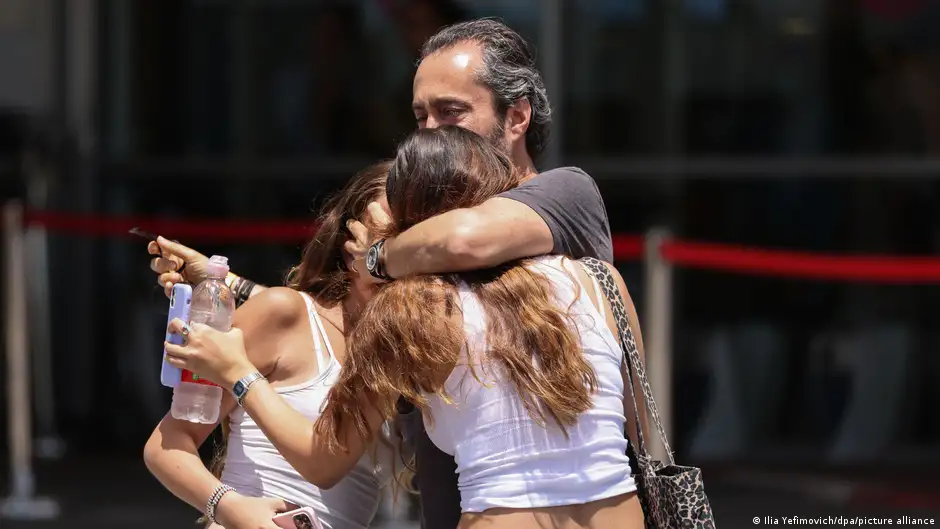
Approval for constructive policy
In German public debate, I see a tendency to assume that pro-Palestinian voices generally feel a fundamental antipathy towards Israelis and Jews. But that is demonstrably false. In the 1990s, for example, when the Oslo peace process began, two-thirds of Palestinians were in favour of a two-state solution.
The great majority of people – including those in Israel – were glad that the conflict was going to be resolved. When politics is constructive, there is majority agreement on both sides. So it is not the case here that two peoples are utterly set on mutual annihilation.
Nor is Israel pursuing a genocidal agenda, in my opinion. Much more applicable is the concept of state terrorism, the transgression of legitimate state limitations when more civilians than soldiers are killed in war. We have an asymmetrical conflict between a terrorist organisation on the one hand and on the other a nation that is likewise crossing boundaries and repeatedly resorting to state terrorism.
Terms such as anti-Semitism and genocide are of little help in analysing the conflict. I don't understand why these terms are dominating the debate in Germany. That seems to me like a refusal to really engage with the conflict.
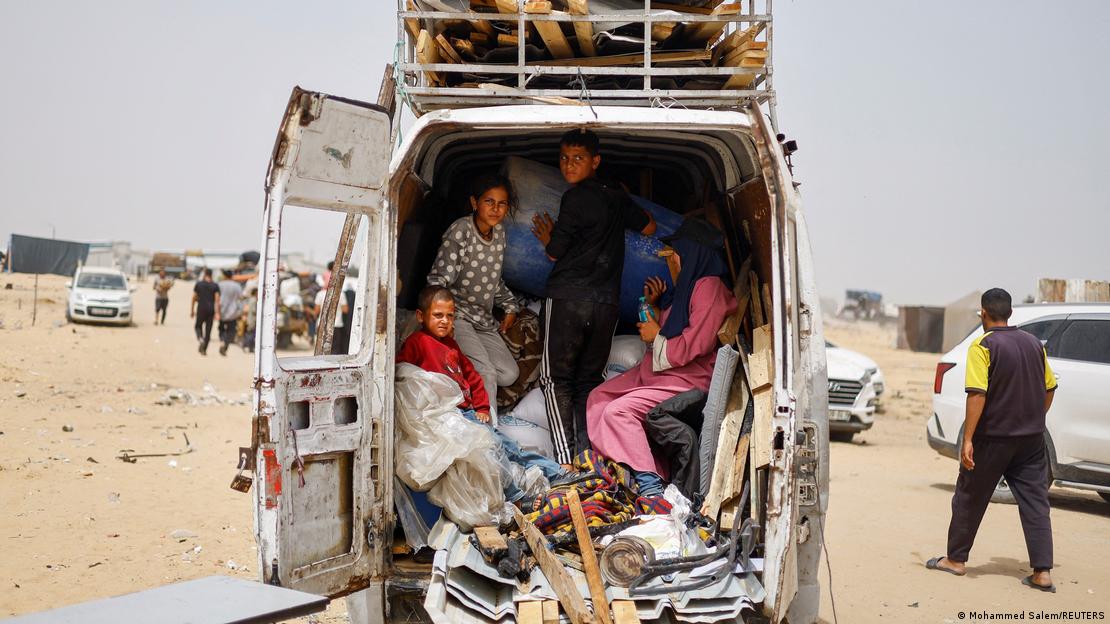
Resentment blocks empathy
A strange aloofness prevails in German coverage of the conflict. In the first few months after 7 October, leading liberal media wrote that Israel had every right to defend itself militarily; if civilians were killed in the process, then so be it. And even today, little outrage is expressed over the many dead women and children. Was this also the case in earlier conflicts?
Hafez: Palestinians have never been granted the same degree of empathy as others in the majority of German media. One reason is certainly self-made, because the media never shows us Palestinian suffering in the same light as the travails of Israeli Jews. We see too few pictures of the victims, whereas in the international media, dead and injured children are shown on the front pages in the press and appear on the evening news. In today's society with its strong focus on visuals, I think it is important for people to see what is happening in the Gaza Strip.
In addition, the Arab population tends to be dehumanised here. This has to do with anti-Islamic and anti-Arab tendencies. Studies have shown that the majority of the German population has considerable difficulty accepting oriental and Islamic culture. A great deal of anxiety prevails, such as the fear that Islam is a violent ideology, that aggressive people are coming here who are patriarchal and wield Kalashnikovs. These are common associations for many people. How are we supposed to develop empathy with people towards whom there is so much resentment?
Does this mean that Islamophobic and anti-Arab attitudes with all their baggage are causing extreme reactions?
Hafez: This is not the only area where this occurs. You can observe something similar in the case of right-wing radicalism and right-wing extremism. The extent to which racism is exploited in German society to various ends has not yet been recognised clearly enough. Eighty percent of Germans claim to be against racism, while at the same time, 60 percent of these supposed anti-racists see Islam as the most dangerous religion in the world. So basically, many people continue to cultivate their "salon racism" under different guises.
Indeed, this is where our culturally and historically accumulated baggage trips us up. We need to see things more clearly, including with regard to right-wing extremism. Too little attention is paid to how the AfD party casts Islam in the role of arch-enemy, including in its agenda. As a member of the expert panel working on behalf of the ministry of the interior, I have been looking into this very issue. The AfD programme expresses a fundamental hostility towards Islam. Incidentally, the ministry of the interior has yet to implement the many recommendations for action in the report on combatting Islamophobia.
People simply refuse to talk about it. After the Hanau attack and in the wake of the Black Lives Matter movement, an expert opinion was requested, but no one is interested in the consequences and the results have been ignored. This can certainly be described as structural racism in German politics. And that attitude is passed on to the media and the public. No impetus is forthcoming from policymakers, either on the subject of Islamophobia, or with regard to taking a more balanced stance on Gaza, and the media space to a certain extent reflects this non-attitude.
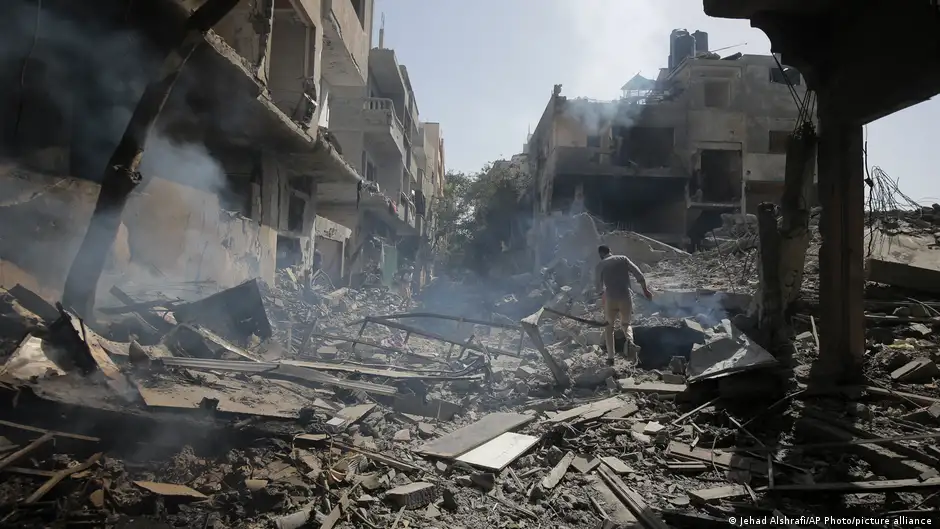
Media as role model?
What do we need now in the debate?
Hafez: We need to use more precise language and more nuanced categories so that we can move away from this polarity of "terrorism versus genocide". That can only succeed with a healthy dose of intellectualism, something that is in very short supply in Germany at the moment.
Where is the conversation taking place that we need to have about the future of the Middle East conflict and Germany's relations with the conflict region? Politicians and the media are not fulfilling their function as role models and too little is coming from the academic community.
I hear from colleagues that authors are once again dropping out of book projects about Edward Said because the topic has become too hot for them. That is scandalous. Events are being cancelled, discussions are no longer being held for fear of coming into contact with the wrong stakeholders.
The University of Cologne's rejection of Nancy Fraser is a huge catastrophe, as are other cases in which renowned international intellectuals have been banned from the German sphere of discourse to avoid making any mistakes.
I fail to understand university presidents and politicians who intervene in processes like those in Cologne and Berlin. Such interference in the freedom of academia must not be permitted in Germany.
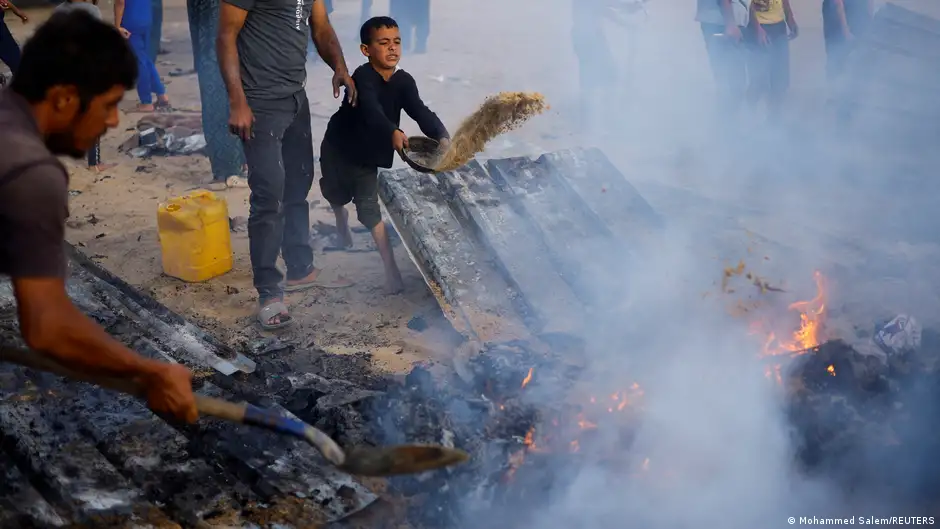
Traditional narratives versus a rational approach
What do you think of the media framing of the conflict?
Hafez: We are dealing here with a firmly entrenched David versus Goliath motif. Israel is forever cast in the role of David, even if the real balance of power today makes it more of a Goliath. But this switch seems to be something we can't get our heads around.
Traditional narratives are blocking the way to a rational approach to the conflict. An analysis of the Middle East conflict cannot lead to the conclusion that Israel is the sole victim. If we observe what has been happening in Israel and the Palestinian territories for decades, Israel is as much perpetrator as victim, perhaps even more perpetrator.
This development began with the assassination of Yitzhak Rabin in 1995 by a Jewish extremist. The murder marked the end of the Oslo peace process. The second intifada by the Palestinians was followed by the disintegration of the Israeli peace movement. Today, people in Israel are not protesting on behalf of the Palestinians, but for their own interests. The actions of the various Israeli governments have destroyed lives in many ways and displaced Palestinians from Jerusalem and the settlement areas. Promises regarding the West Bank were not kept, and the Gaza Strip was permanently sealed off militarily.
Mistakes were also made on the other side. Hamas has developed into an authoritarian organisation without democratic legitimacy. I see a symmetry of conflict problems here and not David versus Goliath. We need to understand this reversal of narratives. Israel is the only nuclear power in the Middle East and is certainly technically and militarily superior; it is not unassailable, but so superior that we are forced to recognise a deplorable neo-colonial complex here.
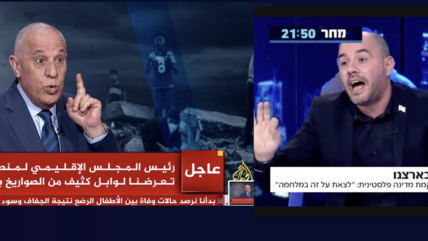
Spewing poison in both directions
In addition to the actual warfare in Gaza, another, lesser known burden is weighing on the prospects for a better future in the Middle East. Influential media channels are lending support to the most radical forces on both sides of the conflict
"Germany's reputation is going down the drain on a massive scale"
The political right in Israel makes no secret of the fact that they see the entire West Bank as Judea and Samaria and they do not want to give this territory back. Solution scenarios are not implemented.
We are plagued by many traditional motifs and myths, often unconsciously, and we need to revise our discourses and strive for greater balance. Remembering the Holocaust is extremely important; I myself have organised conferences on anti-Semitism.
But we must not dump our historical baggage on the shoulders of the Palestinians. This mental block only leads to us isolating ourselves internationally. Germany's reputation is going down the drain on a massive scale. Our international standing is suffering just like that of the USA in 2003, when the U.S. forfeited its role as moral leader during the Iraq war.
Germany is imitating these double standards of morality in the context of the Gaza war and the world is holding it against us. This loss of image will also have an economic impact. When in doubt, people will choose to work with other partners. The pervasiveness of these double standards is evident to everyone.
"I fear growing alienation"
What impact are these double standards having on German society?
Hafez: The Gaza war is leading to a feeling of alienation between young migrants and people with a migration background versus the political and media elites. It used to be that many Muslims in Germany had more confidence in the system than non-Muslims. Studies exist showing they regard Germany as a reliable constitutional state.
Apart from the police, German institutions have had a relatively good image among migrants until recently. But with the Gaza war, we are in the process of gambling away this credit and pushing people with a migration background into parallel societies for good. I fear a growing sense of alienation.
We are seeing a form of communication with migrant youth that draws arbitrary distinctions, one in which any symbolic willingness on the part of German politics and mass media to engage in dialogue seems to me to be lacking.
Interview conducted by Claudia Mende
© Qantara.de 2024
Translated from the German by Jennifer Taylor
Kai Hafez is a political and media scientist and professor at the University of Erfurt. His research focuses on comparative cultural media ethics, media and politics in Germany and the Middle East, and foreign reporting. In 2020, he was appointed to the Federal Ministry of the Interior's "Independent Expert Group on Islamophobia (UEM)".
